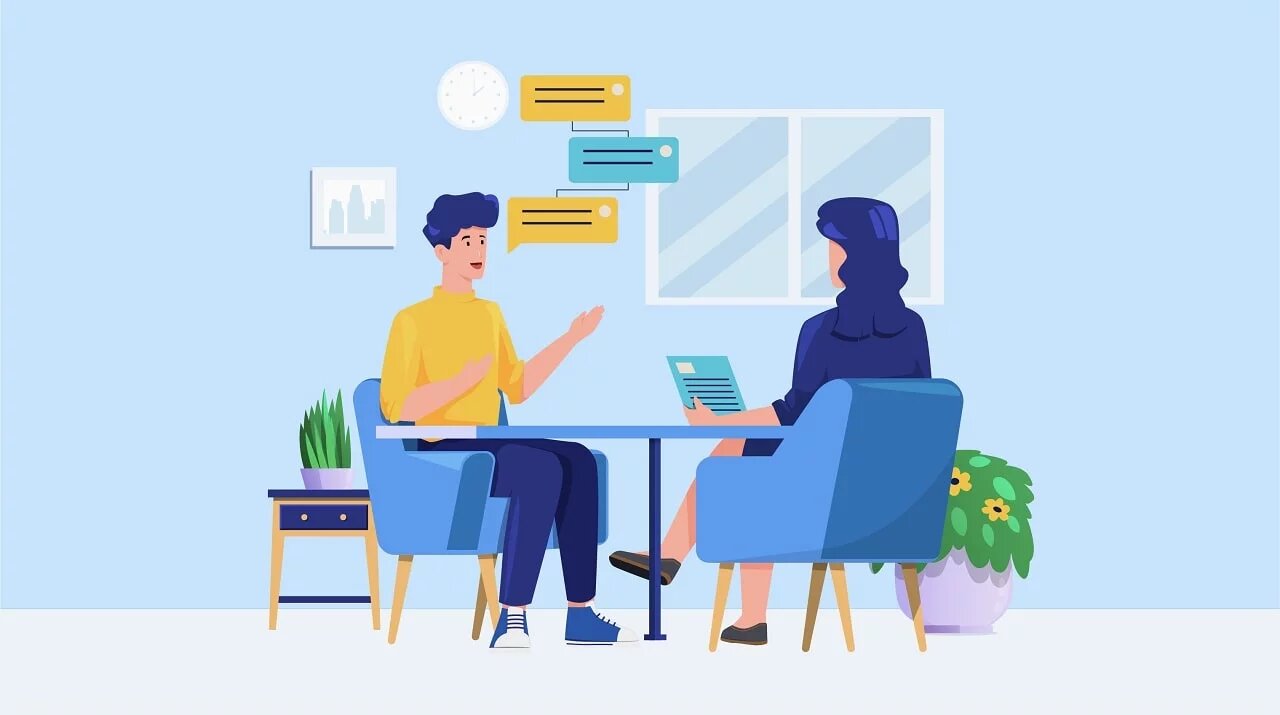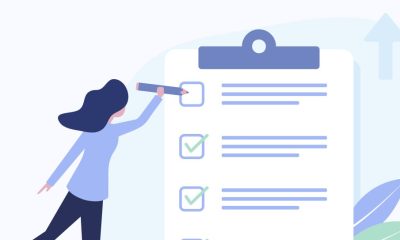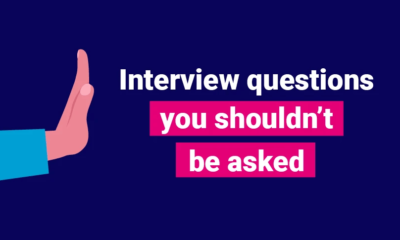Career Tips
How To Answer, The ‘Tell Me About Yourself,’ Question In A Job Interview

“Tell me about yourself.” It’s a popular (and tough) job interview question. Many job searchers dismiss the question as an icebreaker.
However, most interviewers take “tell me about yourself” seriously. Hiring managers ask this open-ended question to get a better idea of each candidate’s aims and priorities.
Interviewers also ask this question to assess applicants’ confidence, which gives them a glimpse of how new hires will interact with customers, clients, and coworkers.
As a job seeker, answering “tell me about yourself” allows you to highlight your talents and expertise. It’s a good approach to start because many recruiting supervisors ask it first. Job interview tips:
To better answer the question, you first need to understand why they ask it in the first place.
Hint: the interviewer isn’t looking for your life story, or what you had for dinner last night.
The question helps them get to know you before the interview.
It’s an introduction, and your response will assist the interviewer decide what to ask next.
Your initial impression matters.
Answer well, and the interviewer will gladly ask more questions.
If you fail, you’ll be the “OK Candidate.”
“Good answer?” It’s simple. Good answers are:
Tailored – Applying for an accounting job? The recruiter doesn’t care about your work experience as a real estate agent. Your answer should be tailored to the job you’re applying for.
Based on Experience & Achievements – Your answer should be super-specific. Don’t just say “so um, my name’s Mike and I’m a sales manager.” Your answer should consist of background (what did you study?), top achievements (how do you stand out from the other candidates), and interests (why are you applying for this job?).
…And…
Structured – Your answer should follow a simple, easy-to-follow format. We’d recommend sticking to the tried-and-tested “Past-Present-Future” formula. Meaning, structure you answer as follows:
The past – what is your background and relevant work experience? How did you get to where you are now?
The present – what is your current role? What do you do and what are your top accomplishments?
The future – what are you looking to do next? Why are you interested in the position?
Keeping these tips in mind, here’s what a good answer to “tell me about yourself” would look like:
Correct Answer:
“Sure, so, my name is Joe and I am 27 years old.
For the past 5 years, I’ve been working as a business analyst at Company X and Y.
I have some background in data analysis, with a degree from University XY. What really got me into the field, though, is the internship I did at Company Z.
Throughout my career, I’ve noticed that I’ve always been good with numbers and handling data.
For example, when I was working at Company X, I led a project for migrating all operations data to a new data warehousing system to cut down on costs. The new solution was a much better fit for our business, which eventually led to savings of up to $200,000 annually.
Moving forward, I hope to expand my experience across different industries. Particularly fintech, which is why I’m interested in your company..”
Here’s what’s done right:
- The answer is tailored. Joe doesn’t stray off-topic, he talks about his experience as a business analyst, and his past achievements in working with data.
- The answer is based on experiences and achievements. Joe talks about his work experience as a business analyst, and covers some of his top achievements.
- The answer is structured right – past, present, future.
Sounds simple enough, right?
More Tips
1) Keep It Professional and Brief
When responding, try to keep it to no more than 1-2 minutes.
No, the HR manager isn’t interested in your complete life story.
They don’t care where you went to kindergarten, how your first internship went, or what you studied in high school.
You should focus on your primary selling points that are relevant to the position.
If you can see that the interviewer is getting distracted, you should take that as a sign that it might be time to wrap up.
Incorrect answer:
Well, I’ve always been interested in tech.
But it all probably started when I was a kid, and at the age of 9 I first got my computer.
I always loved playing around with code and learning new things. But it wasn’t until that high school where I first had my first class about it that really made me fall in love with the subject.
Since then, I started learning more about it and decided to major in IT at University X where I learned how to.
2) Practice, But Don’t Memorize
You’re bound to hear “tell me about yourself” on just about every interview.
So, all you have to do is practice your answer a bit!
Grab a friend and do a quick mock interview.
However, keep in mind that you should not memorize your answer. Sure, it may appear to be the safest option, but if you forget something during the interview, you may jumble your entire response.
Instead, prepare a rough outline of what you’ll say, memorize the framework, then wing the rest of the interview.
3) Know Your Audience/Interviewer
It’s important to keep in mind who you’re talking to.
Is it the HR? Business manager? The hiring manager? The CTO? CMO? CEO?
You might be wondering, why does this matter?
These people demand different answers. The HR manager interviews a software developer. You’ll lose them if you talk about how much you love coding in Assembly.
The HR manager doesn’t know coding or assembly. They expect a more general response about you, your career, and why you applied to the company.
If the CTO or hiring manager is interviewing you, you can geek out as much as you want.
4) Remember W.A.P. (Work, Academic, Personal)
Every good answer to “tell me about yourself” should consist of:
- Work – This should make up about 80% of your answer. Focus on your previous experience and accomplishments here.
- Academic – 10-15% of your answer should then be about your academic background (university, academic achievements, etc.).
- Personal – Finally the last 5-10% should be about you as a person, while still keeping it relevant to the company.
Keep in mind, though, that the W.A.P. rule isn’t set in stone.
If you’re a student, for example, your entire answer could be about your academic career and personal interests.
Sample Answer for Experienced Professionals:
Sure, I’d be glad to. I’m an tech-focused project manager for up to 8 years now.
I graduated from University X, where I made the Dean’s List, with a major in business administration and a minor in computer science. After that, I first got into the industry working as an administrative assistant at Company X. There I provided clerical support with interdepartmental communication, helped in managing schedules, and maintained the digital filing system.
After that, I was working as a project manager for Company Y that provided cloud computing solutions for about 6 years. There, I personally managed 5+ teams of software projects, and made sure everything went smoothly in terms of business goals, deadlines, budget, and more.
In my downtime, I enjoy reading about AI, tech, and robotics. Since you guys do all 3, I thought I’d apply.
Sample Answer for Fresh Graduates and College Students:
My name is Jane Doe, I’m 22 years old and I recently graduated from University X with a B.A. in international business. While there, I learned a lot of theory in subjects like corporate communication, international economics, corporate governance, and more. I was also part of the student government, and maintained a GPA of 3.6.
I’ve worked hard in my education and now I’m ready to apply my knowledge into practice.
While I don’t have any real-life work experience, I’ve had a lot of exposure to the business environment. A lot of my courses involved working with real companies to solve real problems.
Now, I’m looking to leverage everything I’ve learned in uni and get some hands-on work experience.
Sample answer for university admissions:
So, my name is John, and I’m a senior at School XYZ.
This year, I managed to maintain a 3.7 GPA, while working on a few different school projects. I started an ‘Ernest Hemingway Book Club’ which has up to 15 active members as of now. And I also launched a recycling program for the campus, through which we raised awareness and invited an outside guest lecturer to speak about the subject.
I tend to be teamwork-oriented and reliable, as I’ve never missed a deadline. I’m also proud of my ability to preserve and overcome any challenges as they come up. For example, last year, I was having some trouble with trigonometry. I realized I needed to dedicate more time to the subject, so, I met with a teacher outside the class and set aside two extra hours per day for the subject. Eventually, I ended up with an A in the subject.
At University X, I’m planning to either major in English or Journalism. I love reading and writing, so I think both programs are going to be interesting and relevant to my interests.
Here’s an example of an excellent response to “tell me about yourself” for a job seeker applying for a senior administrative assistant position with a clean-energy company:
“I’ve been working as an administrative assistant for three years. At my current job in the finance department of a midsize company, I handle scheduling, meeting and travel planning for four executives and 20 staff members. I also help prepare correspondence, presentations and reports.
“I’m known for being a detail-oriented, well-organized team player. I never miss deadlines, I’m a good communicator and I can juggle multiple tasks at once. In my performance reviews, my supervisor always notes that he appreciates my professionalism and enthusiasm for the job.
“With this experience under my belt, I’m looking for an opportunity to take the next step in my career. I’m hoping to do so in an organization like yours that works to improve the environment, which is something I’m passionate about.”
A final word on how to answer, ‘tell me about yourself’
- Be brief. Don’t take too long with your replies. You are not required to tell the hiring manager everything that you believe makes you a strong applicant. Just a few key points that will pique their curiosity in learning more about you will get the interview off to a good start.
- Structure your answer in a way that makes sense. Stick to the past-present-future format, and you’re all good!
Keep it relevant and brief (1-2 minutes max). No one wants to hear your whole life story. Mention any of your top achievements and relevant work experiences.


















